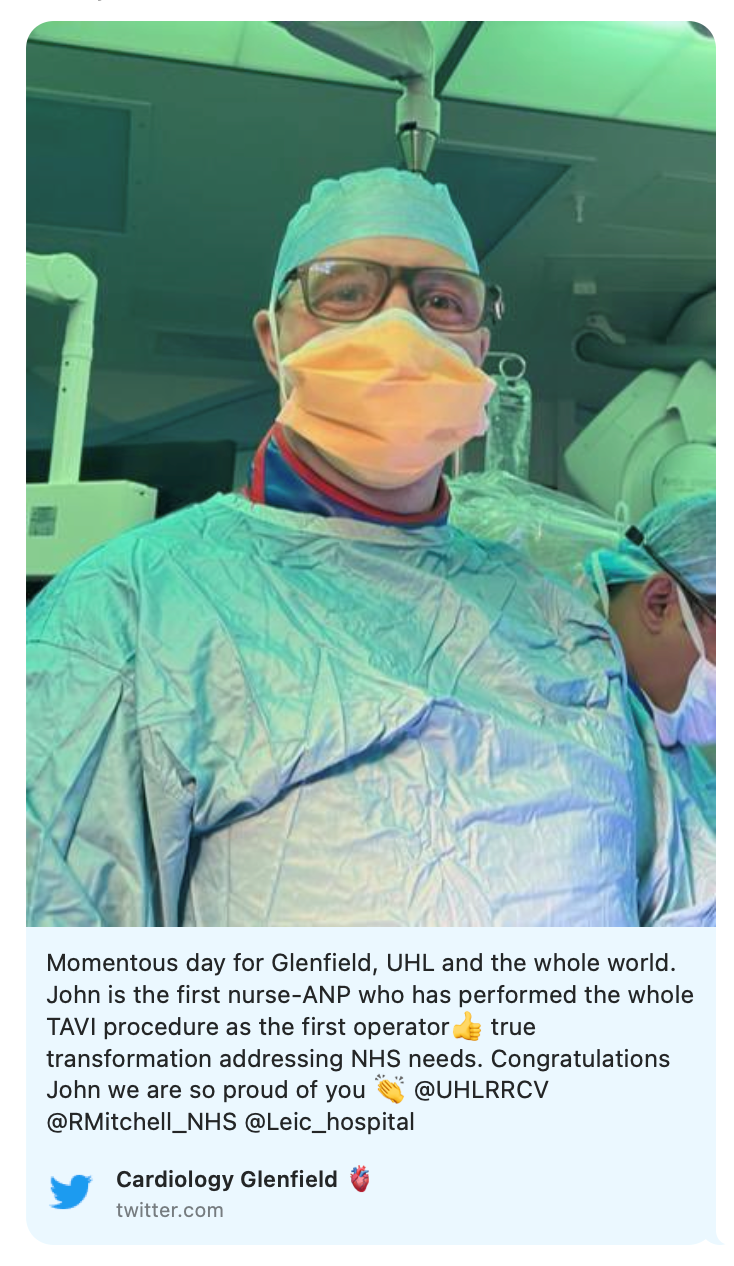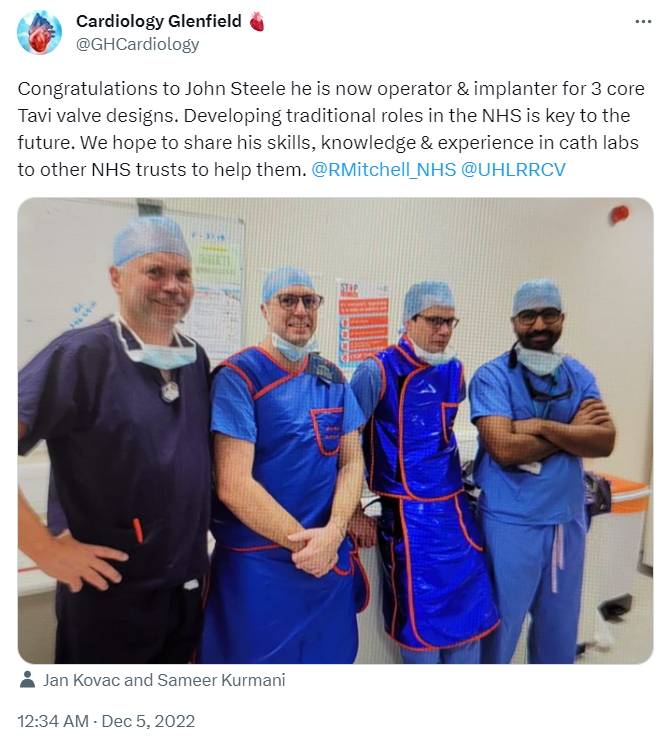Nurse Practitioners Doing TAVI? What’s Gained and Lost
(UPDATED) Cardiology orgs were caught flat-footed after a world-renowned TAVI program tweeted out its congrats to an ANP lead operator.

A photo posted by the cardiology Twitter account at Glenfield Hospital in the United Kingdom, congratulating an advanced nurse practitioner (ANP) for performing a TAVI procedure as first operator, touched off a firestorm on Twitter and Reddit this week and appeared to have caught professional societies off guard.
“Momentous day for Glenfield, UHL and the whole world,” reads the now-deleted tweet from @GHCardiology. “John is the first nurse-ANP who has performed the whole TAVI procedure as the first operator [thumbs up emoji] true transformation addressing NHS needs. Congratulations John we are so proud of you [clapping hands emoji].”
 A screencap of the tweet has been circulating on Twitter all week. Some cardiologists responding to the photo seemed shocked to learn that a nonphysician had the skills—and permission—to do a complex, transcatheter, structural heart procedure; others defended the rights of an ANP to take the lead, so long as their training was sufficient.
A screencap of the tweet has been circulating on Twitter all week. Some cardiologists responding to the photo seemed shocked to learn that a nonphysician had the skills—and permission—to do a complex, transcatheter, structural heart procedure; others defended the rights of an ANP to take the lead, so long as their training was sufficient.
“This took everybody by surprise,” said Rohin Francis, MBBS (East Suffolk and North Essex NHS Foundation Trust, England), who tweeted a thread summarizing the concerns of many.
“I thought I'd speak up because I do a lot of teaching of junior doctors,” he told TCTMD, “but also I'm the clinical director of my department, so I felt like I can bridge both—the concerns from a hospital management/trust point of view in thinking about waiting lists and service provision through my management role, but also as a clinician and as a trainer.”
Learning to do structural heart interventions is typically something a trainee would do only after receiving their certificate of completion of training, which comes after 6 years of medical school and 9 years of training, he said. Moreover, most, if not all, structural heart operators in the UK likely also have a PhD, he added.
I think this is different from the other things we've seen nurse practitioners do before in that it is such a superspecialized thing. Rohin Francis
But the ability to gain technical proficiency is not the only issue, he argued. “I think the reason that complicated operations, surgeries, procedures like this are done by doctors is the whole background and understanding that they bring to the operation,” he said. “Introducing a different route to get to it which hasn't been validated and tried and tested—shouldn't be done in this way.
“I think there are lots of potential ways that different healthcare professionals can and already have expanded their roles,” Francis added, citing the critical roles ANPs play in running valve centers and heart failure clinics. “But I think this is different from the other things we've seen nurse practitioners do before, in that it is such a superspecialized thing that it's not even something that a fully trained interventional consultant in the UK, at least, would expect to do.”
A Different Perspective
Glenfield Cardiology, part of the University Hospitals of Leicester, appears to be taking a different perspective. The cardiology department, headed by Jan Kovac, MD, already has an international reputation in structural heart disease for performing a range of “firsts” for the United Kingdom. Kovac himself is widely hailed as one of the early pioneers in transcatheter valve intervention, having been the first UK operator to perform a TAVI in 2007, a milestone for which he was awarded the National Health Service Innovator of the Year in 2009.
 Scroll back through Glenfield Cardiology’s Twitter feed and another tweet, dated December 5, 2022 (deleted after the publication of this story), congratulates the same advanced nurse practitioner, John Steele (pictured standing beside Kovac), for being the operator and implanter for three different TAVI valve designs. “Developing traditional roles in the NHS is key to the future. We hope to share his skills, knowledge & experience in cath labs to other NHS trusts to help them,” it reads.
Scroll back through Glenfield Cardiology’s Twitter feed and another tweet, dated December 5, 2022 (deleted after the publication of this story), congratulates the same advanced nurse practitioner, John Steele (pictured standing beside Kovac), for being the operator and implanter for three different TAVI valve designs. “Developing traditional roles in the NHS is key to the future. We hope to share his skills, knowledge & experience in cath labs to other NHS trusts to help them,” it reads.
Communications manager for the University Hospitals of Leicester NHS Trust, Gareth Duggan, told TCTMD that senior leadership at UHL would not be responding to TCTMD’s interview requests this week, but plans to soon issue “the most complete possible statement to do justice to such an important development.”
Kovac did not respond to requests for comment.
Cardiovascular Societies Respond
Cardiovascular organizations in the UK and beyond appear to have been caught flat-footed by the announcement, taking several days to craft their reactions.
The British Cardiovascular Society (BCS) responded to a request for comment from TCTMD by neither praising nor condemning the announcement.
“The BCS supports all cardiovascular healthcare workers to deliver the best care to their patients, whether this be physicians, allied health professionals, or clinical scientists,” the statement reads. “Cardiology has always been at the frontier of new models of healthcare delivery and new device therapies to ultimately improve patient symptoms and quality of life. The overriding priority for any aspect of patient care is that the healthcare professional undertaking any procedure is fully trained to deliver that procedure safely. The performance of a specific procedure is only one part of the patient journey, with consultant cardiologists leading the process of diagnosis, treatment choices, management, and follow-up care in direct consultation with the patient.”
Coincidentally, the president-elect of the BCS, electrophysiologist André Ng, MBChB, PhD, is also the head of the department of cardiovascular sciences at the University of Leicester. Ng did not respond to an interview request from TCTMD.
The British Cardiovascular Intervention Society (BCIS) took a similarly careful position but singled out operator volumes as important.
“BCIS welcomes the involvement of highly skilled practitioners in structural hearth disease programs,” the group’s president, David Hildick-Smith, MD (Brighton and Sussex University Hospitals NHS Trust, Brighton, England), told TCTMD in an email. “An advanced nurse practitioner who has been involved in 2,000 TAVI procedures and whose job is dedicated to the TAVI program has developed a wealth of experience, which is greatly to the benefit of patients.”
🚨🚨We have seen this post from a UK hospital highlighting the first time an ANP has undertake a TAVI as first operator.
— BJCA 📊 (@TheBJCA) June 14, 2023
All members of the 🫀 team are valuable. However, we are concerned about the impact that this decision will have had on local trainees. 🚨🚨
All TAVI programs in the country, he continued, “benefit greatly from the specialist nurses who run those programs, often load the valves, and sometimes assist in procedures as a second operator. ANP involvement in TAVI should be seen as complementary rather than competitive with trainees. As medicine has changed so there has increasingly been a role for advanced nurse practitioners to take on responsibilities that were previously considered to be the domain of doctors. In turn, that has freed doctors to focus more on the specifics of an intervention that requires their attention. The responsibility for undertaking a successful procedure will always lie with a physician who has had the breadth of training to manage the possible complications that may occur during a procedure. This requires years of training, and there is no shortcut, or substitute.”
The British Junior Cardiologists Association declined to comment for this story, pointing TCTMD towards their tweeted response which reads: “All members of the [heart] team are valuable. However, we are concerned about the impact that this decision will have on local trainees.”
Who Can Train and How?
What types of training and proficiency are required for structural heart interventions? This, surprisingly, has only recently been the subject of expert opinion. Earlier this year in the US, the American College of Cardiology (ACC), the American Heart Association (AHA), and the Society for Cardiovascular Angiography and Interventions (SCAI) published an “advanced training statement” outlining competency-based training requirements for interventional cardiology fellowships, covering the breadth of skills these programs have to teach for coronary, peripheral vascular, and structural heart interventions.
In the EU, the European Association of Percutaneous Cardiovascular Interventions (EAPCI) is in the midst of drafting a core curriculum document for percutaneous structural heart disease interventions. Rui Campante Teles, MD, EAPCI board co-chair for the International Affairs Committee and one of the writing group leads, told TCTMD the document is “currently under revision and therefore, we cannot disclose its content.”
This requires years of training, and there is no shortcut, or substitute. David Hildick-Smith
Teles did clarify, however, that the structural heart disease interventions curriculum “follows in the footsteps” of the percutaneous coronary interventions competency requirements, published in 2020. Of note, the PCI document specifies that an interventional cardiologist is the subspecialist who performs the procedures and goes on to detail what training and skill set the interventional cardiologist must have, while being “team workers who interact closely with other cardiologists and other medical specialties, nurses, paramedics, and other healthcare professionals.”
But as Francis pointed out to TCTMD, there is no shortage of interventional cardiologists keen to learn these procedures. Instead, what’s lacking are procedures to train on, in a field where operators are required to meet volume targets to gain and retain proficiency. The ACC/AHA/SCAI document, for example, recommends an additional year of fellowship after a 1-year interventional fellowship, during which an operator needs to perform 50 TAVIs, with 25 as primary operator.
“I personally haven't pursued structural training because it is such a difficult and competitive path,” Francis said. “My friends who have, have often been told, ‘Sorry, we can't accommodate [you] right now because it would mean that the other operators reduce their numbers.’ So, the rate-limiting step is not lack of operators, it's lack of infrastructure, it's lack of funding. These are the things that need to be improved if we're wanting to deliver more TAVI, not to widen the pool of a professionals that can do TAVI.”
Hildick-Smith, too, pointed out that trainee positions in structural heart disease in the UK are largely post-CCT (completion of specialist training) and are highly competitive. “Nearly all TAVI centers, including Leicester, have a dedicated cardiology fellow who gets great exposure to TAVI procedures during their fellowship. These operators will move on to structural heart jobs where they will be very thankful if they have such an experienced ANP as Leicester’s to work alongside them.” He added: “There is going to be a need for significant expansion in structural heart training over the coming years, and BCIS will be producing a statement on this subject later in the year.”
Patrick Myers, MD (Lausanne University Hospital, Switzerland), secretary general of the European Association for Cardio-Thoracic Surgery (EACTS), stressing that he was providing his personal views and not that of the EACTS, pointed out that ANPs are often critical to these procedures. “As an example of how important these members of the care team are, the EACTS Council just recently approved the creation of an Allied Health Professionals committee, so that allied health professionals can have representation in the association, and we can have a more complete heart team approach to our educational activities,” he told TCTMD in an email.
In surgical procedures in the US, he noted, nurse practitioners are already doing most of the saphenous vein or radial artery endoscopic harvesting, and other aspects surgical care, for which they are highly trained.
That said, there are “a few issues” for which more answers would be welcome. “What about patient safety, with practitioners who haven't spent years in cardiology or cardiac surgery training doing advanced procedures? How are the ANPs to do TAVI being trained? How will they manage complications? Are they ‘independent,’ or under the supervision of trained physicians? With more practitioners doing the procedures, how about training our residents? And [what about] maintaining competencies within a usually small group of proceduralists?”
Many of these questions, he noted, have already been raised on Twitter.
Significant Expansion or Scope Creep
No one who spoke with TCTMD discounted the critical role played by nurses and other allied healthcare practitioners in many areas of medicine. The problem is whether training an ANP to do these very complex procedures means one less physician will get the training they’re seeking, Francis argued.
“This is part of a wider discussion that we've had over the last 10 to 15 years of what's often referred to as scope creep and how there are certain things that you need to learn in order to become an experienced physician, but for which there are fewer training opportunities already,” he said. “Numbers have gone down across the board. If you look at any craft specialty like interventional cardiology or surgery, people are doing far, far fewer hours in the cath lab or the operating theater by the time they become a consultant than in 2010, 2005.”
Lack of opportunities comes at a time when junior doctors are already striking in the UK for better pay and better training and working conditions. Tweets like the one that went out last week aren’t helping with plummeting morale.
“The carrot that used to keep us going was: one day, we will become specialists of whatever field we're going into and then we would have autonomy and would have the ability to do what we enjoy and to offer a good service to patients,” Francis said. “I think the feeling is that if it is becoming so increasingly unpleasant and challenging, and other people can skip a lot of those unpleasant hurdles in order to access that same carrot, that same goal, then people are questioning: why did I put myself through this? Why did I accrue all this debt? Why did I move my family all around the country and move from one hospital to another every 6 months when there was an alternative route where I could have just stayed in one place and spent far less money on exams and things like that?”
Procedural costs and salaries are likely on the minds of hospitals watching this controversy unfold, and have certainly occurred to some Twitter commentators. According to UKTalent.com, the average advanced nurse practitioner salary is £50,173 per year, typically starting at £45,000 per year, with the most-experienced workers earning up to £82,751 per year. By contrast, the average consultant cardiologist salary in the United Kingdom is at £93,774 per year, roughly similar to that of an interventional cardiologist, according to the same survey tool. The starting salary for a consultant cardiologist across specialties, set by the British Medical Association 2003 contract pay scale, is £88,364 per year, rising to £119,113 after 19 years.
Should ANPs do TAVI?
— TCTMD (@TCTMD) June 16, 2023
Shelley Wood was the Editor-in-Chief of TCTMD and the Editorial Director at the Cardiovascular Research Foundation (CRF) from October 2015…
Read Full Bio




Comments